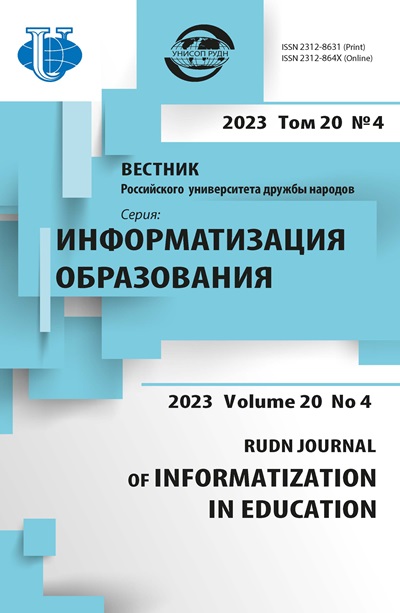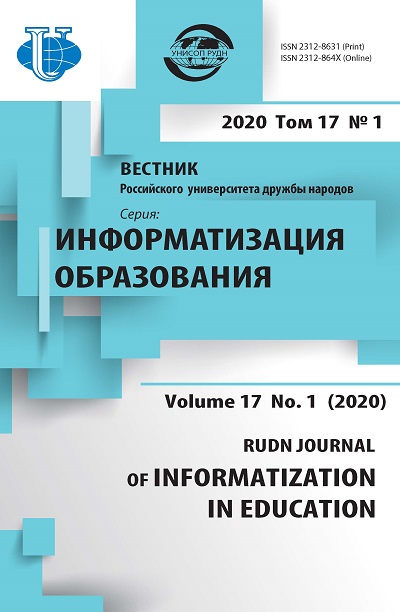Designing a system of electronic training materials for remote post-training support for corporate training
- Authors: Zaslavskaya O.Y.1, Levchenko M.S.2
-
Affiliations:
- Moscow City University
- International group of pharmaceutical companies “STADA”
- Issue: Vol 17, No 1 (2020)
- Pages: 36-48
- Section: EDUCATIONAL ELECTRONIC PUBLICATIONS AND RESOURCES
- URL: https://journals.rudn.ru/informatization-education/article/view/23701
- DOI: https://doi.org/10.22363/2312-8631-2020-17-1-36-48
Cite item
Full Text
Abstract
Problem and goal. The article describes how to organize electronic training materials for post-training support. The relevance of the article is determined, on the one hand, by the external needs to expand the sphere of education, the tasks of further development of informatization of education, and on the other hand, by the internal needs of the development of the information culture of students [1; 13; 6-8]. The problem is determined by the presence of a contradiction between the existing high didactic potential of distance post-training support, the importance of such training for effective training of students and the absence of such training, implemented using a structural approach to the design and use of electronic training materials. The purpose of the article is to describe approaches to the development and testing of a system of electronic training materials implemented on the basis of the structural approach for organizing post-training support using distance learning technologies. Methodology. The methodological basis was the ideas for the implementation of distance learning presented in the works of A.A. Andreeva, E.S. Polat, V.I. Soldatkina et al.; the main provisions of the theory of technologization of the learning process, which were studied by V.P. Bespalko, P.I. Pidkasisty, G.K. Selevko, A.M. Sohor et al.; issues of structuring training materials that were considered by I.V. Akimova, A.I. Arkhipova, Yu.I. Askerko, I.V. Burov, S.A. Butakov, L.P. Voronina, D.V. Danilov, A.M. Sokhor, O.E. Filippov, L.S. Chernyshov and others. Scientific articles devoted to issues of corporate training and personnel development are presented by such authors as: A. Bychkov, O. Dugina, Zh. Zavyalova, I. Kolodkina, A. Korolkov, A. Matveev, A. Miroshnichenko, O. Naydenov, M.V. Klarin, A. Novikova, N. Titova, N. Khryashchev, O. Emikh, A. Satvalov. Results. The feasibility of using distance learning technologies in the implementation of post-training support for students, as well as the application of a structural approach to the design and use of a training materials system for distance post-training support for students is substantiated. The principles and conditions of using the structural approach as the basis for the design and use of specially selected training materials, systematized in the form of a set of competencies and presented using distance learning forms, have been identified. Information and telecommunication technologies and Internet resources have been selected to organize remote post-training support, taking into account the individual learning path. Conclusion. The results led to the conclusion that the effectiveness of the proposed approaches to the selection, design and use of a system of training materials allows us to take into account the following aspects: accounting for training parameters, level of development, level of competency, level of motivation. The proposed model of distance post-training support for students on the example of the discipline “Information Technologies in the Management of the Educational Process”, based on the use of a structural approach, containing a specially designed system of electronic training materials, has made it possible to increase the effectiveness of training for undergraduates and to build an individual training route.
About the authors
Olga Yu. Zaslavskaya
Moscow City University
Author for correspondence.
Email: zaslavskaya@mgpu.ru
doctor of pedagogical sciences, full professor, professor of the department of informatization of education of the Institute of Digital Education
29 Sheremetyevskaya St, Moscow, 127521, Russian FederationMaya S. Levchenko
International group of pharmaceutical companies “STADA”
Email: mslevchenko@yandex.ru
manager of the international group of pharmaceutical companies “STADA”.
44 Bolshaya Ordynka St, bldg. 4, Moscow, 119017, Russian FederationReferences
- Abdullaev SG. Ocenka effektivnosti sistemy distancionnogo obucheniya [Evaluating the effectiveness of the distance learning system]. Telekommunikacii i informatizaciya obrazovaniya [Telecommunications and informatization of education]. 2007;(3):85–92.
- Arhipova AI. Postroenie elektronnogo obrazovatel'nogo resursa na osnove sistemnostrukturnogo podhoda [Building an electronic educational resource based on a systemstructural approach]. Available from: http://icdau.kubsu.ru/EOR_matem/struk_proizv/ files/metod.html (accessed: 20.09.2019).
- GOST R 53620-2009. Informacionno-kommunikacionnye tekhnologii v obrazovanii [Information and communication technologies in education]. Moscow: Standartinform Publ.; 2018.
- Grinshkun VV. Vliyanie kachestva informacionnyh resursov na formirovanie gotovnosti pedagogov k informatizacii obrazovaniya [Influence of the quality of information resources on the formation of teachers' readiness for informatization of education]. Available from: https://cyberleninka.ru/article/n/vliyanie-kachestva-informatsionnyhresursov-na-formirovanie-gotovnosti-pedagogov-k-informatizatsii-obrazovaniya (accessed: 20.09.2019).
- Davydova IP, Lebedeva MB, Mylova IB et al. Pedagogam o distancionnom obuchenii [To teachers about distance learning]. Saint Petersburg: RCOKOiIT Publ.; 2009.
- Zaslavskaya OYu. Informatizaciya obrazovaniya: novoe ponimanie mesta i roli uchitelya v uchebnom processe [Informatization of education: a new understanding of the teacher's place and role in the educational process]. Vestnik Moskovskogo gorodskogo pedagogicheskogo universiteta. Seriya: Informatika i informatizacija obrazovanija [Bulletin of the Moscow City Pedagogical University. Series: Informatics and Informatization of Education]. 2007;(9):81–82.
- Zaslavskaya OYu. Obrazovanie vzroslyh: sostoyanie, problemy, perspektivy [Adult education: state, problems, prospects]. Novye znaniya [New knowledge]. 2004;(1):8.
- Zaslavskaya OYu. Trebovaniya k podgotovke uchitelya informatiki v usloviyah realizacii deyatel'nostnogo podhoda [Requirements for training a computer science teacher in the conditions of implementation of the activity approach]. Bulletin of Peoples’ Friendship University of Russia. Series: Informatization in Education]. 2010;(3):21–27.
- Kiselev GM, Bochkova RV. Informacionnye tekhnologii v pedagogicheskom obrazovanii [Information technologies in pedagogical education]: textbook. Moscow: Dashkov i K Publ.; 2018.
- Klarin MV. Korporativnyj trening, nastavnichestvo, couching [Corporate training, mentoring, coaching]. Moscow: Yurajt Publ.; 2017.
- Koshkina EN. SWOT-analiz primeneniya distancionnogo obucheniya v Rossii [SWOTanalysis of distance learning in Russia]. Available from: https://cyberleninka.ru/article/ n/swot-analiz-primeneniya-distantsionnogo-obucheniya-v-rossii (accessed: 20.09.2019).
- Kobzeva VV, Baranova GV. Rukovoditelyu ob obuchenii personala: dizajn posttreninga [Head of staff training: post-training design]. Moscow: Dobraya kniga Publ.; 2006.
- Lebedeva MB, Agaponov SV, Goryunova MA, Kostikov AN, Kostikova NA et al. Distancionnye obrazovatel'nye tekhnologii: proektirovanie i realizaciya uchebnyh kursov [Distance learning technologies: design and implementation of training courses]. Saint Petersburg: BHV-Peterburg Publ.; 2010.
- Makarov YuV. Psihologiya professional'nogo posttreningovogo soprovozhdeniya [Psychology of professional post-training support]. Available from: https://cyberleninka.ru/article/ n/psihologiya-professionalnogo-posttreningovogo-soprovozhdeniya (accessed: 20.09.2019).
- Samylkina NN. Sovremennye sredstva ocenivaniya rezul'tatov obucheniya [Modern means of evaluating learning outcomes]. Moscow: BINOM. Laboratoriya Znanij Publ.; 2007.
- Senge PM. Pyataya disciplina. Iskusstvo i praktika obuchayushchejsya organizacii [The fifth discipline. The art and practice of a learning organization]. Moscow: Mann, Ivanov i Ferber Publ.; 2018.
















